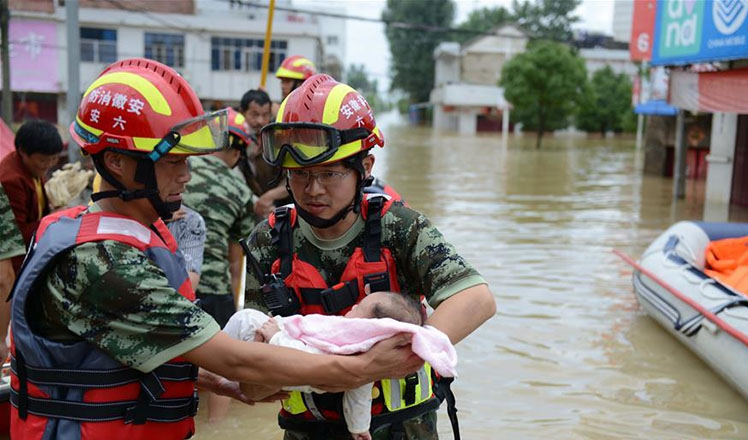Iraq War report reveals folly of intervention
Updated: 2016-07-11 07:57
By Fu Jing(China Daily)
|
||||||||
The UK government released the report on the results of the inquiry into the Iraq War last week, which was scathing of the military intervention into Iraq by the United States and the United Kingdom in 2003.
There were a number of key findings.
In the Inquiry's view, the US-led coalition resorted to force to remove Saddam Hussein before the diplomatic options had been exhausted, in a way which undermined the authority of the United Nations Security Council. It said, the case for war was presented with "a certainty which was not justified" and was based on "flawed intelligence".
And despite explicit warnings, the consequences of the invasion were underestimated and the planning and preparations for Iraq postwar were wholly inadequate.
The report is extremely critical of Tony Blair, the British prime minister at the time, rejecting his claims that the insurgency and terrorism which have plagued Iraq since Saddam's fall could not have been foreseen.
"The risks of internal strife in Iraq, active Iranian pursuit of its interests, regional instability and al Qaida activity in Iraq were each explicitly identified before the invasion," Sir John Chilcot said, when introducing the report
Of course, the conclusions would suggest that a similar inquiry on decision-making process that led to the Iraq War ought to be conducted in the United States, which masterminded the invasion of Iraq. George W. Bush, who served as US president from 2001-09, should also be facing such stern questioning as well.
But more importantly, the report should offer awake-up call to the world about the folly of military interventions amid rising geopolitical concerns in many regions.
On Friday, when the leaders of NATO met in Warsaw, the BBC reported that a 500-strong UK battalion is to be deployed to Estonia and 150 troops will be stationed in Poland as part of the alliance's response to concerns about Russia.
The United States has long stood behind Japan, the Philippines and other Asian countries in their disputes with China, triggering rising security concerns in the Asia-Pacific region.
And it was announced on Friday, the US' Terminal High Attitude Area Defense missile system will be deployed in South Korea, despite China's concerns.
All these have been unfolding mainly due to the unrivalled military capabilities of the US and its longstanding hegemonic foreign policy.
In contrast, China has become more active in peacefully engaging with the world, seeking solutions to issues that do not involve force, and promoting a community of shared destiny for all mankind.
It is hard and challenging. But the Iraq War report should remind policymakers and decision-makers that resorting to war is both wrong and bloody.
The decisions of politicians today will be judged by generations to come. The politicians of the West should not jump to the easy conclusion that those leaders who do not follow their line should be deposed.
That logic is not viable in today's world.
The author is the deputy bureau chief for China Daily in Europe. fujing@chinadaily.com.cn
- Eid al-Fitr celebrated worldwide
- Swedish PM looking at tightening laws after festival sex attacks
- British PM race cut to 3 hopefuls as 2 contenders exit contest
- Chinese herbalists offer free US treatment
- Obama praises Hillary's judgement hours after FBI's censure
- Rio mayor tells Olympic visitors: 'Don't expect New York or London'

 Griezmann scores twice to lift France into Euro final
Griezmann scores twice to lift France into Euro final
 Life goes on in flooded Wuhan
Life goes on in flooded Wuhan
 Paper cutouts offer a new view of world landmarks
Paper cutouts offer a new view of world landmarks
 Animals occupy Shanghai
Animals occupy Shanghai
 Beijing Muslims mark end of Ramadan
Beijing Muslims mark end of Ramadan
 Remember emerging heroes in China's floods
Remember emerging heroes in China's floods
 Ronaldo powers Portugal into Euro 2016 final
Ronaldo powers Portugal into Euro 2016 final
 Culture Insider: Six things you may not know about Minor Heat
Culture Insider: Six things you may not know about Minor Heat
Most Viewed
Editor's Picks

|

|

|

|

|

|
Today's Top News
Ministry slams US-Korean THAAD deployment
Two police officers shot at protest in Dallas
Abe's blame game reveals his policies failing to get results
Ending wildlife trafficking must be policy priority in Asia
Effects of supply-side reform take time to be seen
Chinese State Councilor Yang Jiechi to meet Kerry
Chinese stocks surge on back of MSCI rumors
Liang avoids jail in shooting death
US Weekly

|

|









